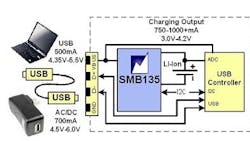Tiny Chip Speeds Li-ion Charging From USB
A 1-A USB/ac Li-ion battery charger IC, the SMB135 from Summit Microelectronics (www.summitmicro.com) offers a combination of features that optimize operation in single-cell applications powered by the Universal Serial Bus (USB) or other current-limited power source. According to the vendor, this is the first charger chip that can boost the 500 mA supplied by the USB to a 750-mA charging current, enabling faster battery charging. And because the SMB135 is a switch-mode charger it operates with higher efficiency than other chargers and is less likely to invoke internal thermal protection, which limits charge rates to keep die temperatures in bounds. The charger chip also features full programmability with on-chip EEPROM and tiny chipscale packaging.
“USB charging is becoming very popular with some products only accepting power from the USB port,” said George Paparrizos, marketing manager at Summit Microelectronics. “ The number one issue with USB is that low charging current means slow charging. The SMB135 addresses this issue by making a higher charging current available and by reducing power dissipation in the chip.”
The SMB135 is the first product in a family of programmable Li-ion charger ICs aimed at the latest portable consumer applications. The chip takes advantage of a trend in single-cell Li-ion applications whereby the equipment uses a single mechanical connector (USB) for power and data. With this approach, the same power cable is used whether the equipment is connected to a USB port or an ac-dc adapter, which saves cost in the application. The single cable approach also eliminates the requirement that the charger IC be able to arbitrate between two separate inputs.
But in lieu of arbitration, the IC needs to implement two charging algorithms—one for ac adapters and another for USB ports. The SMB135’s programmability makes this possible. When the chip is connected to a USB port, it detects USB communications and invokes its USB charging algorithm. Otherwise, the charger invokes the adapter algorithm.
The SMB135 comprises a 1-A current-mode stepdown switching battery charger including a fully programmable algorithm for single-cell Li-Ion batteries. All charging parameters—pre-charge/fast-charge/charge termination current, cell float/pre-charge voltage, battery temperature/timer safety limits—are configurable via the I2C/SMBus interface enabling a wide variety of algorithms without hardware changes. The charger can be programmed either dynamically (real-time using volatile registers), by a microcontroller and software via the I2C/SMBus port, or statically (pre-programmed using non-volatile registers).
The programmable algorithm combined with the inherent current multiplication effect of the switching regulator enables Summit’s Turbo Charge mode to deliver up to 750 mA charging current from a standard 500-mA USB port or up to 1 A from an ac-dc adapter. This represents more than double the charge current typically available from competing solutions and cuts the battery charge time by as much as 66%, according to the vendor.
The SMB135’s switch-mode operation reduces power dissipation by as much as 90% compared to competing linear-mode charger ICs. This lower power dissipation reduces the need for thermal foldback current limiting, which slows charging, while also allowing the SMB135 to be packaged in a 1.3-mm x 2.1-mm chip-scale package (CSP) with 15 solder balls providing a thermal and electrical interface with the pc board. In contrast, other switch-mode chargers come in 4-mm x 4-mm or larger packages. Meanwhile, linear charger solutions typically come in large packages and require extra pc board copper “flood” areas for heatsinking.
Switching frequency is programmable between 750 kHz and 1.25 MHz, enabling use of small external passives. Reverse leakage current is less than 2µA, ensuring long battery life when not connected to a dc power source. The SMB135 integrates overvoltage, short-circuit and thermal protection circuits. In addition, the SMB135 protects the battery pack with a programmable battery temperature sensor and charge timers to prevent dangerous charging conditions.
Available now, the device is priced at $0.98 each in quantities of 10,000 units. The company also offers a companion evaluation board and graphical user interface (GUI) software.
